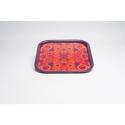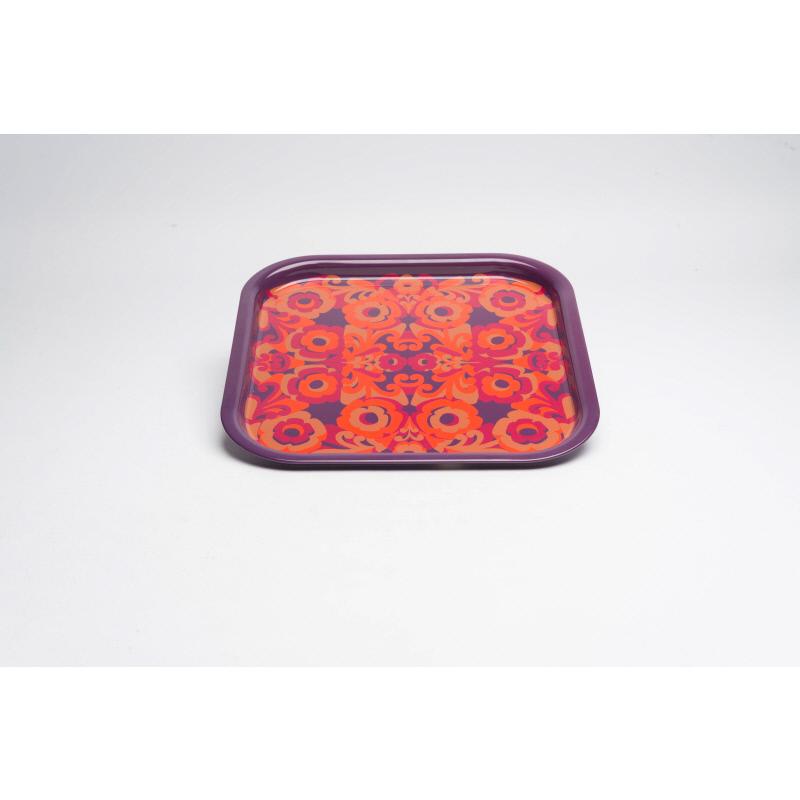Tray
Classification(s):
Metal
Date: c.1951 - 1976
Organisation: JRM Design Limited
Dimensions:
336 × 336 mm (33.6 × 33.6 cm)
Medium: Tin, enamel
Object number: M298H
See Also
Place of Production:England
DescriptionEnamelled tin tray, by JRM Design Limited. Made in England. The square tray has been printed with a pop art design, it has a floral pattern in orange, pink and gold on a purple base. Sticker to side “-/6”.
ProvenanceThis object was originally acquired from The Primavera Gallery, London.
This object was originally acquired for the Inner London Education Authority’s (ILEA) ‘Circulating Design Scheme’ collection.
The collection was instigated by the London Country Council (later the Greater London Council) and the Council of Industrial Design (COID). The collection’s original purpose was concerned with the teaching and dissemination of modern, ‘good design’.
The collection was established in 1951/52 as the ‘Experiment in Design Appreciation’, later renamed the ‘Circulating Design Scheme’.
The Circulating Design Scheme lent boxed showcases to London schools. The showcases contained handling objects, material samples and interpretation on a specific subject.
COID withdrew its involvement in the Scheme in 1957. After which time, it was managed exclusively by the London County Council from 1957-1963.
After the administrative restructuring of London authorities, the Scheme was jointly managed by the Greater London Council and the Inner London Education Authority (ILEA) from 1963 – 1976.
The Scheme was operational until 1976 when the collections were withdrawn from circulation. ILEA was abolished in the late 1980s and the collection was donated to Camberwell College of Arts in 1989/90.
ILEA was responsible for secondary and tertiary education in the inner London boroughs, this included Camberwell.
This object was originally acquired for the Inner London Education Authority’s (ILEA) ‘Circulating Design Scheme’ collection.
The collection was instigated by the London Country Council (later the Greater London Council) and the Council of Industrial Design (COID). The collection’s original purpose was concerned with the teaching and dissemination of modern, ‘good design’.
The collection was established in 1951/52 as the ‘Experiment in Design Appreciation’, later renamed the ‘Circulating Design Scheme’.
The Circulating Design Scheme lent boxed showcases to London schools. The showcases contained handling objects, material samples and interpretation on a specific subject.
COID withdrew its involvement in the Scheme in 1957. After which time, it was managed exclusively by the London County Council from 1957-1963.
After the administrative restructuring of London authorities, the Scheme was jointly managed by the Greater London Council and the Inner London Education Authority (ILEA) from 1963 – 1976.
The Scheme was operational until 1976 when the collections were withdrawn from circulation. ILEA was abolished in the late 1980s and the collection was donated to Camberwell College of Arts in 1989/90.
ILEA was responsible for secondary and tertiary education in the inner London boroughs, this included Camberwell.
NotesThis object was circulated to London schools as part of the Inner London Education Authority’s (I.L.E.A) Circulating Design Scheme, which operated from 1951-1976. The tray printed with pop art design featured in the ‘Pop, Folk, Modern’ group in case number 1. The boxed showcase introduced the ‘pop art’ movement and described how it influenced British culture. It also introduced ‘folk art’, describing it as the output of “ordinary folk who had not been trained as professional artists”. This object was originally acquired from The Primavera Gallery, London. The associated record card indicates the boxed showcase was in use from 1968-76. Original photograph of boxed showcase by Harold King (Photography) Ltd, Morden, Surrey.
This object was originally acquired from The Primavera Gallery, London -
Henry Rothschild established himself as a gallery owner in 1945; he built personal relationships with important makers and greatly contributed to the flourishing of studio crafts in the 1950s. With his patronage of craft, Rothschild opened Primavera Gallery, which became known as a haven for experimental studio potters.
The surviving documentation surrounding the administration of the Inner London Education Authority’s (I.L.E.A) Circulating Design Scheme and the lending of boxed showcases to London schools inventories contents and frequently cite an object’s supplier. Schools were provided with a photograph and record card for each boxed showcase, allowing teachers to identify, check, record and report any missing or damaged objects on arrival. This documentation provides provenance information, reaffirming the relationship between I.L.E.A and Primavera. The latter supplied to the Scheme a variety of material including studio pottery, mass manufactured tableware, metal ware, folk art and ethnographic objects, examples of pop art and eighteenth and nineteenth century Dutch pastry moulds.
Primavera held numerous exhibitions. We know that I.L.E.A and the London County Council (L.C.C) bought from these exhibitions. In 1968 Primavera exhibited a group show of studio potters in the exhibition ‘German Potters’. The individuals later became known as the ‘German Group’, and it is likely that much of the German studio pottery in the collection was acquired from Primavera at this time.
Many of the objects that were exhibited in Primavera’s exhibition ‘International One: exhibition of folk art and crafts’ in 1963 were later acquired for the collection. For example, European pastry moulds, Mexican figurines and Peruvian ceramics originated from this show.
Rothschild travelled frequently and brought folk art and traditional craft from various countries. These objects were exhibited and sold through the Gallery, catering to the nascent trend for the ‘exotic’. The wooden ethnographic objects featured in the boxed showcase of the ‘Commonwealth Wood’ group are evidence of Rothschild’s propagation.
Primavera also stocked product design, for example the Ecko Ltd ‘Nova’ stackable tableware was purchased from Primavera.
This object was originally acquired from The Primavera Gallery, London -
Henry Rothschild established himself as a gallery owner in 1945; he built personal relationships with important makers and greatly contributed to the flourishing of studio crafts in the 1950s. With his patronage of craft, Rothschild opened Primavera Gallery, which became known as a haven for experimental studio potters.
The surviving documentation surrounding the administration of the Inner London Education Authority’s (I.L.E.A) Circulating Design Scheme and the lending of boxed showcases to London schools inventories contents and frequently cite an object’s supplier. Schools were provided with a photograph and record card for each boxed showcase, allowing teachers to identify, check, record and report any missing or damaged objects on arrival. This documentation provides provenance information, reaffirming the relationship between I.L.E.A and Primavera. The latter supplied to the Scheme a variety of material including studio pottery, mass manufactured tableware, metal ware, folk art and ethnographic objects, examples of pop art and eighteenth and nineteenth century Dutch pastry moulds.
Primavera held numerous exhibitions. We know that I.L.E.A and the London County Council (L.C.C) bought from these exhibitions. In 1968 Primavera exhibited a group show of studio potters in the exhibition ‘German Potters’. The individuals later became known as the ‘German Group’, and it is likely that much of the German studio pottery in the collection was acquired from Primavera at this time.
Many of the objects that were exhibited in Primavera’s exhibition ‘International One: exhibition of folk art and crafts’ in 1963 were later acquired for the collection. For example, European pastry moulds, Mexican figurines and Peruvian ceramics originated from this show.
Rothschild travelled frequently and brought folk art and traditional craft from various countries. These objects were exhibited and sold through the Gallery, catering to the nascent trend for the ‘exotic’. The wooden ethnographic objects featured in the boxed showcase of the ‘Commonwealth Wood’ group are evidence of Rothschild’s propagation.
Primavera also stocked product design, for example the Ecko Ltd ‘Nova’ stackable tableware was purchased from Primavera.





